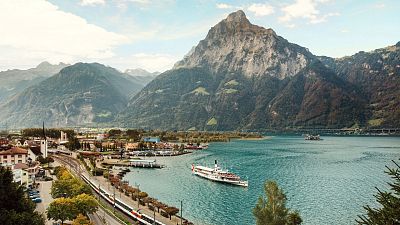
Cuckoo clocks, precision watches and fondue are just some of the things you might associate with Switzerland. Lizards, pizza and neoclassical buildings not so much.
Yet Ticino, an Italian-speaking canton in the south of the country, known for its balmy climate and subtropical gardens, as well as – naturally – breathtaking Alpine scenery, has them all.
Just over an hour’s drive from Milan or a panoramic train and ferry journey south from Lucerne, Ticino is Switzerland’s very own little Italy.
An unashamedly Italian region
Situated on the northern shores of the glacial Lake Lugano, Lugano is unashamedly Italian, with a culture closely related to Italy’s Lombardy region.
The historic city of 70,000, an important banking centre, is packed full of Italianate buildings, Mediterranean-style squares and beautiful parks, like Parco Ciani, which sits right by the lake and contains a jetty and a library, as well as plants and trees from all over the world.
It’s all overlooked by the soaring Monte Brè and San Salvatore mountains. Sit and watch the world go by over a cappuccino at Vanini Dolce e Caffè in Piazza Riforma. Or try a slice of ‘bread cake’, a local speciality made from amaretto, grappa and stale bread (it’s far tastier than it sounds) from Gabbani salumeria on Via Pessina.
Morcote is Ticino’s most beautiful village
An hour’s ferry ride from Lugano and just a 20-minute drive to the Italian border, Morcote is one of Ticino’s loveliest villages, a lakeside idyll flanked by multi-million dollar villas that cling to the lower slopes of Monte Arbostora.
Ristorante della Torre has created the perfect lunch spot with an open-air covered terrace overhanging the lake and serves gourmet pizza and other Italian cuisine.
Work off the calories with a climb up 402 steps to the Chiesa Santa Maria del Sasso, a 15th-century church with frescoes and a view to die for.
In Parco Scherrer, a stepped Italianate garden named after its late founder and passionate gardener Arthur Scherrer, tiny lizards dart among the cypresses and eucalyptus trees.
While mini versions of the Trevi Fountain in Rome and an Arabian palace add a note of playfulness.
If you’re looking for a romantic wedding location – and you couldn’t do much better than this – you can rent the gardens for your big day.
Make a splash in Locarno
Pretty Locarno, a resort town situated on the northern shore of Lake Maggiore at the base of the Alps, is famous for having the sunniest climate in Switzerland.
It also hosts an annual film festival (this year is its 75th anniversary) in Piazza Grande which attracts Hollywood A-listers and there are various fine art collections in the splendid palazzi hidden in the hillsides.
To relax after a day’s sightseeing, take a dip in the Termali Salini & Spa, a public saltwater pool and spa overlooking the lake and mountains. When the mercury rises in summer, cool off in Lido Locarno – it has an Olympic-size outdoor swimming pool, as well as thermal pools, water chutes, slides and wave effects and is a fun day out for adults and children.
For a place to stay, Hotel Belvedere has 90 refurbished rooms, tropical landscaped gardens and a funicular stop just outside the grounds. Opened in the late 19th century, it’s set on a hillside with panoramic views over the lake and Locarno itself. A double room with balcony, lake view and buffet breakfast starts from €282.
Bellinzona is Ticino’s picturesque capital
Dominated by the “tre castelli”, three 15th-century castles built by the dukes of Milan and now a UNESCO World Heritage site, Bellinzona is the capital of the Ticino, one of Switzerland’s 26 cantons, or regions.
Visit for the lively weekly market (held on Saturday mornings), picturesque piazzas and wide choice of independent boutiques and cafes. The city is also one of the main stops on the Gotthard Panorama Express, a thrilling four-hour train and boat ride through fairytale Alpine scenery to Lucerne in the German-speaking part of Switzerland, 140km to the north.
On the way, you’ll pass Swiss folk hero William Tell’s chapel and the Rütli meadow, where Switzerland was founded in 1291. A second-class ticket costs €51.50.
Ascona is made for the passeggiata
With its mild climate and traffic-free lakeside promenade dotted with cafes and restaurants, Ascona, on the northern shore of Lake Maggiore was made for the passeggiata, the leisurely evening stroll beloved of so many Italians.
The Latin ambience continues in Borgo, the old town, where narrow, winding streets contain more interesting places to eat and the 16th-century bell tower of San Pietro e Paolo church serves as a landmark.
In the Maggiatal and Centovalli valleys nearby, there are lots of hiking and biking trails and, on the edge of town, an 18-hole golf course.
